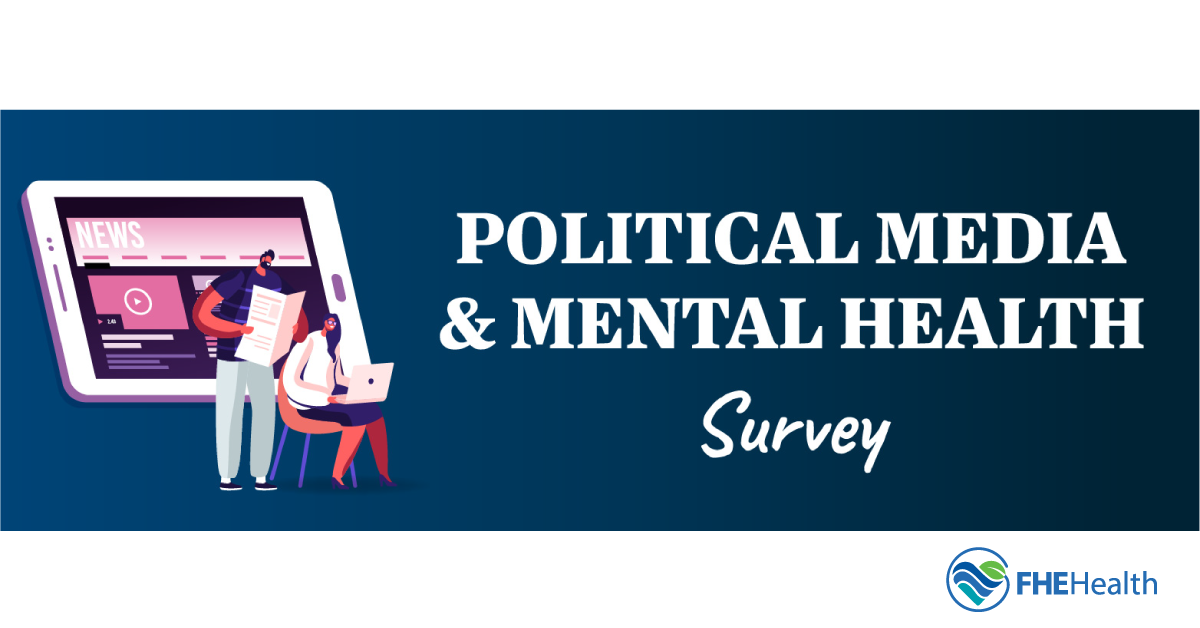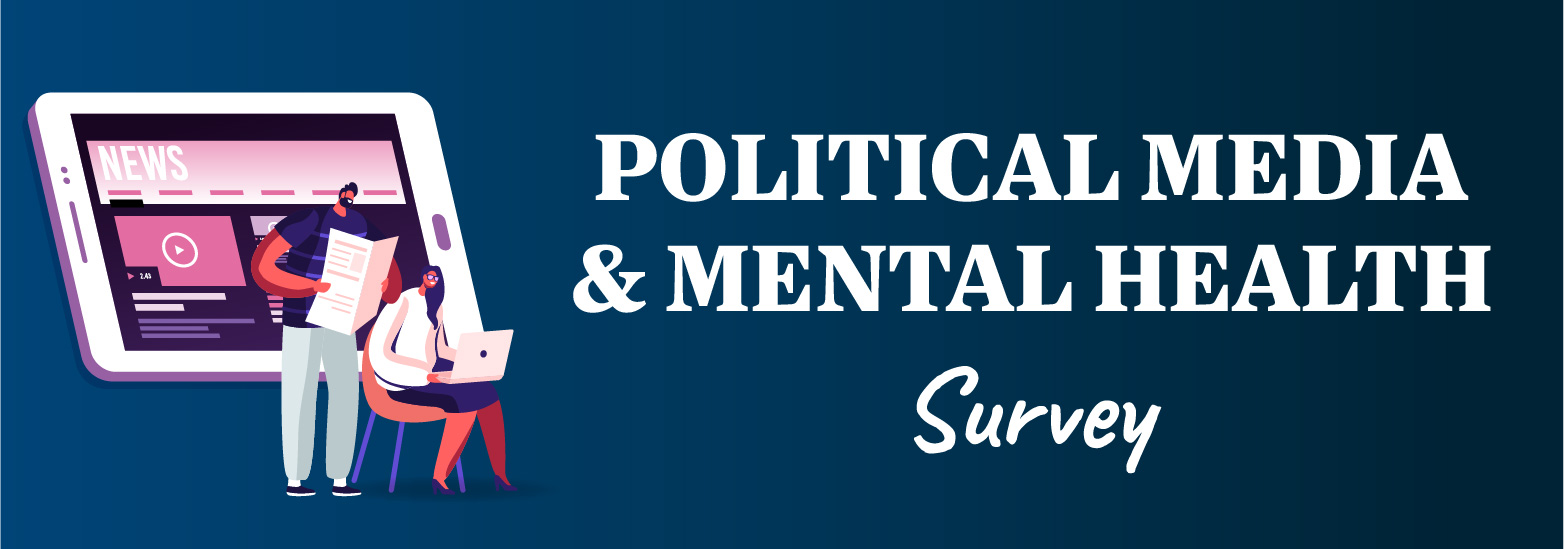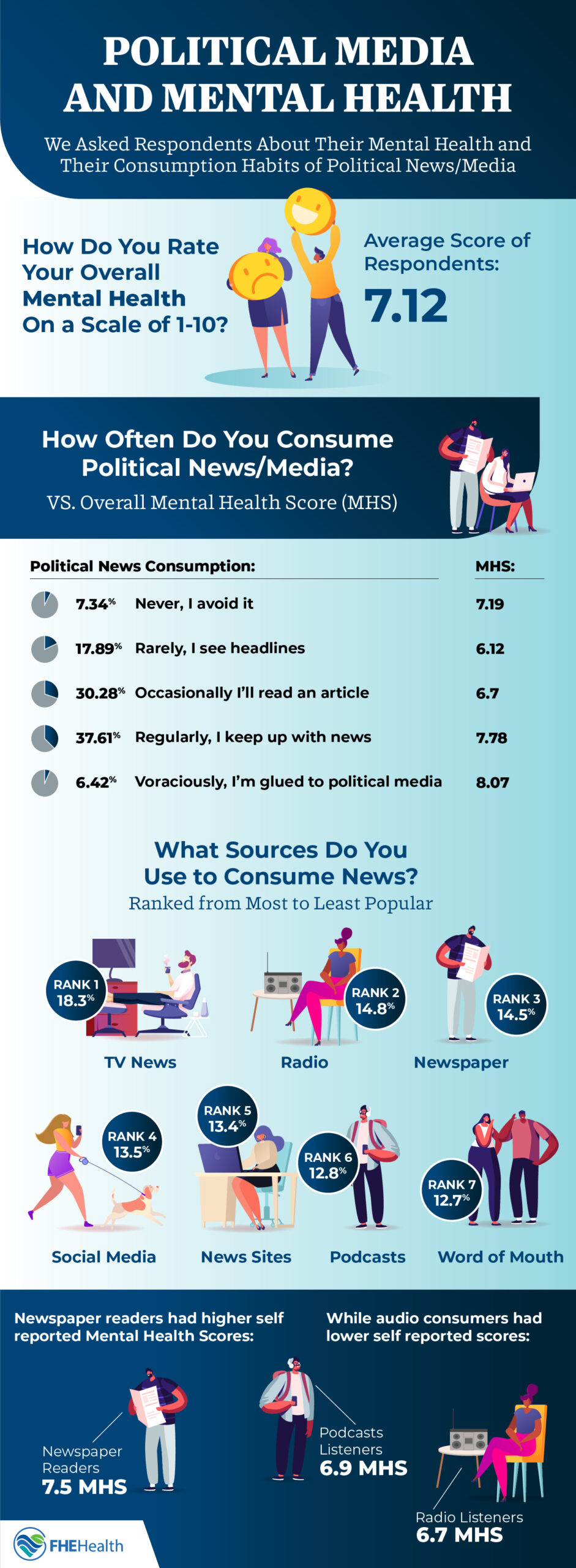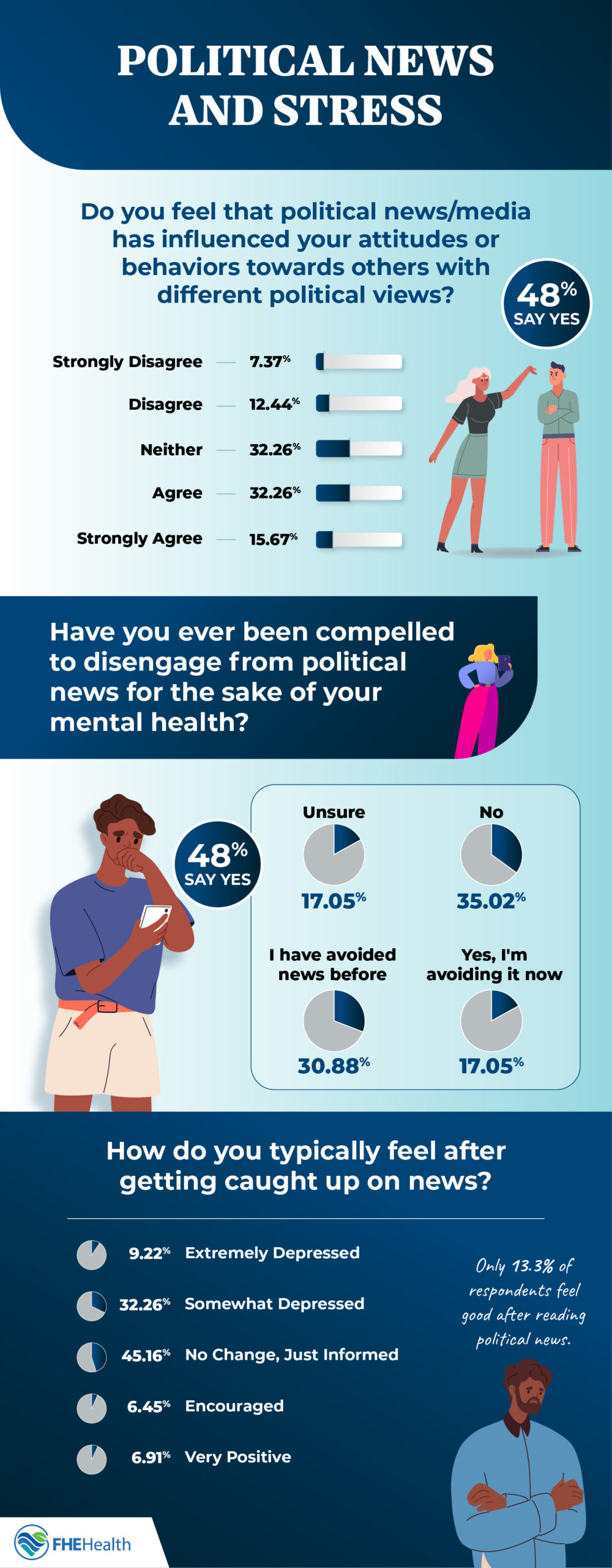
On April 18, 1930, a BBC news announcer had nothing to report, simply stating, “There is no news today.” For the rest of the segment, listeners heard nothing but piano music.
The idea of “no news today” seems foreign in a time when the newsreel never stops. Starting in June of 1980, when CNN introduced 24-hour news programming, we’ve had constant access to breaking stories and important updates on ongoing events. In more recent decades, our options for information consumption have grown significantly, expanding from newspapers, radio and television to include podcasts, social media, email, texts and apps on our smart devices.
With information coming at us so fast from so many different sources, we wanted to find out whether media consumption – specifically, political media consumption – affected our mental health. To that end, we organized a survey to evaluate how often the general population took in political news and how they rated their mental health.

Our Survey and Data Collection Methods
Is There a Correlation Between Political Media Consumption and Mental Health?
To get a baseline of how people rate their overall mental health, we asked respondents to evaluate their mental health on a 10-point scale, with 10 being optimal. The overall average score was 7.12.
Using that information, we had survey participants describe how often they take in political media, ranging from never to voraciously, and we identified the overall mental health ratings for each group. Surprising to some, survey results indicated that the more closely someone follows the news, the higher they rate their mental health. On the flip side, the less someone was informed, the lower they reported their mental health. There was one exception, however; those who reported avoiding the news altogether reported a baseline mental health score of 7.19, which is a little higher than the average score of 7.12. Here’s the in-depth look:
- Never; I avoid it entirely: 7.34% of respondents; mental health score of 7.19
- Rarely; I see headlines: 17.89% of respondents; mental health score of 6.12
- Occasionally I’ll read an article: 30.28% of respondents; mental health score of 6.7
- Regularly; I keep up with news: 37.61% of respondents; mental health score of 7.78
- Voraciously; I’m glued to political media: 6.42% of respondents; mental health score of 8.07

How Do People Prefer to Take in the News?
We have more options than ever for how we keep up with the news, from traditional mediums such as the newspaper to more recent options such as social media. To find out more about our survey respondents’ preferences, we used a ranking system, asking them to put various mediums in descending order. We assigned seven points to respondents’ first-place preference, six points to their second-place preference, and so on.
Based on the feedback we got, we found that television news won by a fairly large margin as respondents’ most preferred news medium, outpacing podcasts and word of mouth by about 50%. Additionally, it may be surprising to learn that as popular as social media platforms are, they rank well below television, radio and newspapers for consuming political news. Word of mouth ranked as the least preferred option.
The full results of the ranking system are as follows:
- TV News: 1115 points
- Radio: 897 points
- Newspaper: 882 points
- Social Media: 817 points
- News on Websites: 812 points
- Podcasts: 777 points
- Word of Mouth: 774 points
Does Age Impact Preferred Media?
As we expected to find, a respondent’s age correlated closely with their preferred news media. When we looked at the 18-29 group, we found that about 26% of individuals ranked Social Media among their top two news media preferences. By contrast, only 4% put Newspapers in their top two choices. In the 45-60 age group, about 13% listed Social Media in their top two choices, and among those aged 60 and over, that number dropped to only 2%. Across all age groups, 21-32% of people listed Television among their top two preferences.
Does the Preferred News Medium Impact Mental Health?
Each option for taking in the news has benefits and drawbacks, along with varying degrees of accessibility, bias and reliability. When categorizing respondents according to their preferred news media, we observed consistent ratings in how they reported their mental health. Based on an overall average of 7.12, we found that those who prefer to get political news through the newspaper reported above-average mental health scores, while those who relied on audio formats such as podcasts and radio stations tended to report lower scores. The people who listed television news among their top two preferred media gave their mental health a near-average rating of 7.13.
- Newspaper: 7.50
- News on websites: 7.19
- Television news: 7.13
- Social media: 8.03
- Word of mouth: 7.00
- Podcasts: 6.96
- Radio: 6.73

How Does the Preferred News Medium Impact 2024 Election-Related Anxiety?
Next, we wanted to assess whether a respondent’s preferred news outlet had any impact on how positive or negative they felt about the 2024 presidential election. Overall, our results showed that those who followed political podcasts and television news programming reported the greatest levels of anxiety. While those who rely on social media were the least anxious, we still found that about half of these respondents reported election-related anxiety.
Here’s the complete breakdown of the percentage of people who reported election-related anxiety:
- Podcast: 65.3%
- TV News: 61.06%
- Newspaper: 59%
- Radio: 57.69%
- Word of Mouth: 55.5%
- News on Websites: 54.1%
- Social Media: 50.7%
Where Do Respondents Fall on the Political Spectrum?
To identify how political leanings may influence election-related anxiety, we asked our survey participants to tell us how they identify politically, giving them the option to select as many answers as they felt fit their beliefs. Then, we compared their reported mental health scores across each category.
The largest reporting groups among respondents were Independent, followed by Liberal, Conservative, Democrat and the GOP. Our survey found that election-related anxiety was common across the political spectrum, though more so among those identifying with the left side of the aisle. Just under half of those who marked Conservative reported election-related anxiety compared to 75% of left-leaning participants.
Overall, mental health scores ranged from 6.88 up to 7.88 among our respondents, compared to the overall average of 7.12. In general, our respondents who identified as Far Right reported the strongest mental health scores, while those who had no party affiliation reported the lowest scores.
- Left Leaning: 75% had election-related anxiousness; mental health score of 7.3
- Member of the Democratic Party: 68.3% had election-related anxiousness; mental health score of 7.5
- Liberal: 63.4% had election-related anxiousness; mental health score of 6.94
- Independent: 62% had election-related anxiousness; mental health score of 7.02
- No Party Association: 55.8% had election-related anxiousness; mental health score of 6.88
- Right Leaning: 68% had election-related anxiousness; mental health score of 7.2
- Member of the GOP: 60% had election-related anxiousness; mental health score of 7.51
- Conservative: 49% had election-related anxiousness; mental health score of 7.62
- Far Right: 64.7% had election-related anxiousness; mental health score of 7.88
We asked respondents whether they ever felt stress or anxiety due to consuming political news. Over half indicated this wasn’t an issue for them, while about 17% said that they never experienced anxiety and roughly 37% said that they rarely did. On the other hand, nearly 30% of respondents linked their own stress and anxiety to political news consumption, and about 16% said they often felt anxious due to political news.

Seeking Out Bias in Political News Media
Where we get the news, and the angle it’s presented to us from, can have a significant impact on how we view current events. We wanted to determine the role news bias plays when consumers are choosing their outlets, so we asked survey participants where they seek out political media that lines up with their own beliefs and opinions. Unsurprisingly, only a fifth of respondents disagreed or strongly disagreed with this statement. Roughly 32% of people expressed a neutral opinion, while 47% of participants agreed or strongly agreed that their news preferences align with their political persuasions.
Gender and Political News-Related Anxiety
When we broke results down by gender, we found that females were far more likely to experience stress or anxiety after political news consumption, with 51.22% of females agreeing with the statement versus about 36.95% of males. Similarly, when asked if they were anxious about the 2024 election, only 14.64% of females reported that they weren’t anxious compared to 21.74% of males. On the other hand, 62.6% of females said they were concerned about the election compared to 50% of males.
Do Politics Affect Personal Relationships?
Along with getting a robust view of how political news impacted optimism regarding the upcoming election, we wanted to see whether politics created strain in interpersonal relationships. We asked a series of questions regarding whether participants have experienced negative social interactions related to political discussions. We found that around 24% disagreed or strongly disagreed that they’ve experienced politically charged arguments or conflicts, while about 25% of survey respondents neither agreed nor disagreed with the statement. The remaining half of people (51.15%) said they had experienced negative social interactions when discussing politics, either in person or online.
Additionally, a quarter of respondents admitted to altering their friend group or contact with family members because of political differences. Roughly 30% of people said they hadn’t changed their social circles, and another 31% said that they hadn’t consciously changed altered contact with friends or family because of politics.
Does political media influence how people see others who don’t share their viewpoints? According to our survey, politically biased news can be divisive, with nearly half (47.8%) of our respondents saying that political media has influenced their attitudes towards others with different views. On the flip side, about 20% disagreed with this statement while a third of respondents (32.26%) neither agreed nor disagreed.
Do People Believe They Would Benefit from Consuming Less Political Media?
While we found that those who were most informed tended to report above-average mental health scores, we wanted to identify whether individuals felt the need to disconnect from political news for the sake of their mental health. Over a third of our survey respondents (36.41%) said they neither agreed nor disagreed that consuming less political news would positively impact their mental health. However, while only 16% of people didn’t believe consuming less would have a positive effect, nearly half of people (47.8%) thought their mental health may benefit from reduced political media consumption.
When we asked whether they had actually curbed their political news consumption for mental health reasons, about 48% of participants said that they are avoiding political news now, or have avoided it in the past, for their mental health. A little over a third of people (35.02%) hadn’t disconnected from the news, while 17.05% of respondents selected “Unsure.”
Our survey also found that a large percentage of respondents experienced negative feelings after catching up on the news, with 41% of people saying that they felt extremely or somewhat depressed after seeing political news. About 45% said they felt no emotional change, and only 13% of respondents said they felt encouraged or very positive after catching up on the news.
Are Consumers Satisfied with Mainstream Media?
There are numerous mainstream media outlets to choose from, and many people express loyalty to certain outlets while avoiding others. When we asked survey participants how satisfied they were with mainstream media, only 29% of people were neutral on the matter, and the rest were fairly evenly split in their opinions. Roughly 34% of people said they were dissatisfied or very dissatisfied, while 37% of respondents said they were satisfied or very satisfied.
The Importance of Consuming Political Media Wisely
There are benefits to being politically informed, from knowing how to vote according to your values and interests to honing critical thinking skills. While it’s beneficial to stay informed, it’s also important to find a balance that works for you and helps you safeguard your mental health.
Mindfully consuming political news requires ensuring that you’re taking in accurate information from credible sources and putting parameters on how often you’re checking in on what’s happening in politics. It also means remembering that it’s ok to take a step back and focus on maintaining personal relationships – along with your mental health – if your news intake impacts your stress levels or ability to maintain healthy social connections with friends and family.






